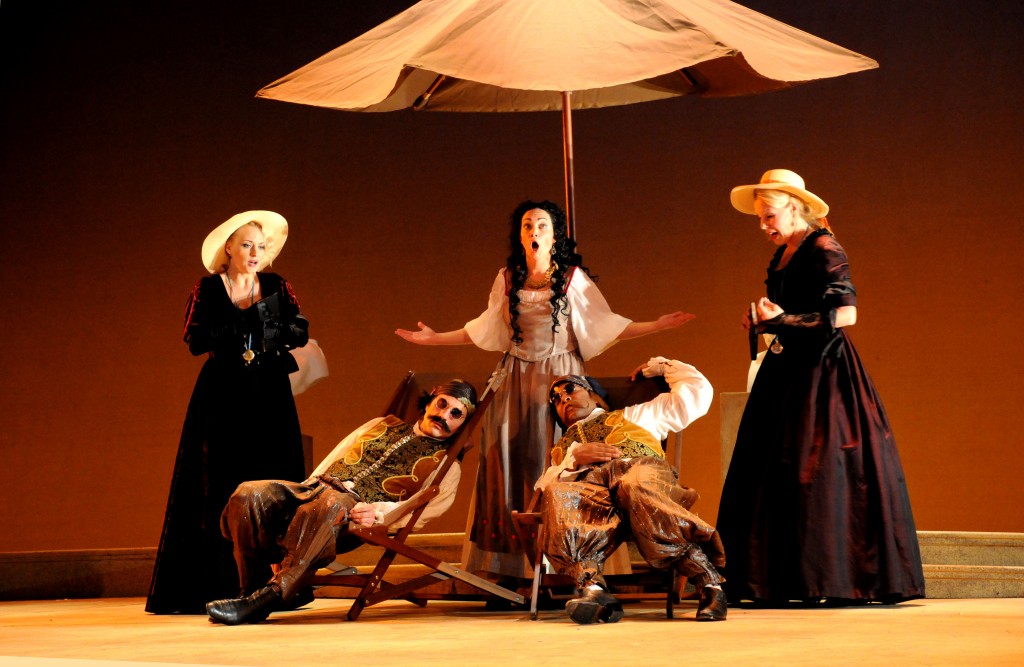Worthy voices lift under-energized production in Palm Beach Opera’s “Cosi”

Palm Beach Opera's production of Mozart's "Cosi fan tutte" plays at the Kravis Center through Monday.
The glorious music, preposterous plot and pseudo-Albanians of Mozart’s Così fan tutte took the stage of Palm Beach Opera Friday, for a production that effectively served the dramatic if not always the musical values of this challenging work.
This production, which completes the company’s survey of the three works Mozart composed in collaboration with the librettist Lorenzo Da Ponte, was marked by clever but not over-the-top stage direction and some fine vocal performances, although it sometimes lacked the vocal and orchestral exuberance to really carry it off successfully.
As Fiordiligi, the soprano Sabina Cvilak was the standout of the cast, singing with fire and vocal gleam. And the mezzo-soprano Abigail Nims was a scene-stealing Despina, the maid whose wit and resourcefulness place her miles ahead of her social superiors, with a sharp voice that easily cut through the ensemble texture when required.
But some of the great ensemble set-pieces that provide some of the opera’s most powerful music felt underpowered, without the energy to create much excitement on stage. The trio of the two male leads and Don Alfonso, for example, where they revel in their successful attempt to fool the two women, lacked the bubbling vitality it has in the best productions. At other times, such as the conclusion of Act 1, the ensemble performance was more effective, possibly because of the greater vocal forces on stage.
Palm Beach Opera’s admirable orchestra easily handled the technical demands of Mozart’s music, an exposed score that’s more difficult in some ways than the company’s bread-and-butter Verdi and Puccini works. But under the baton of guest conductor Gianluca Martinenghi, the playing seemed cramped, without much fizz or propulsive force. Although this may have been to avoid overwhelming the voices on stage, the small-scale sound shorted the music. The orchestra held back too much in the complex, dissonance-tinged accompaniment to Dorabella’s arie, Smanie implacabili. And even the gentle introduction to the fourth scene of Act 1, with its lilting flute melody, sounded constricted.
The veteran director Stephen Lawless created a staging of easy grace and wit, full of whimsical touches that never degenerated into the sort of directorial heavy-handedness that allows the buffa to overwhelm the opera. After the two men pretend to go off to war, he has Fiordiligi and Dorabella—in the overly dramatic grief that inspires eye-rolling in the more skeptical characters—retreat to a position under the burgundy-draped table, singing unseen of their pain, as the more worldly maid Despina listens in patient amusement. And as Cvilak sings Come scoglio, standing on a pedestal with her arms wrapped around one of the statues, she slips and shrieks in the form of the aria’s high note, a perfectly executed piece of vocal comedy that came off without any loss of tonal beauty.
More than most of the well-known Mozart operas, this is an ensemble work, with many of the greatest moments coming in duets, trios and larger combinations. As the two female leads, Cvilak and the mezzo-soprano Jurgita Adamonyte as Dorabella displayed a dramatic and vocal affinity that was among the best elements of the performance.
Cvilak, who sang Desdemona last season at Palm Beach Opera and spent part of last year touring Europe and Asia with Andrea Bocelli, was the strongest voice in the cast. Her Come scoglio was a model of controlled anger, with the faint over-the-top feeling of a woman protesting too much.
Adamonyte was a vivacious stage presence who brilliantly conveyed the demure enthusiasm with which the character approaches her new romantic opportunities, but also brought great warmth to the trio wishing the men a safe return from war. The women made an effective vocal combination in duets, such as First Act scene in which they sing the praises of their fiancees.
The two male leads performed effectively if not quite up to the level of the women, as they disguised themselves as Albanian suitors to test their paramours’ loyalty. As Guglielmo, the baritone David Adam Moore brought style and wit to Non siate ritrosi, his catalogue of the Albanians’ manly attributes.
As Ferrando, the tenor Norman Shankle, who sang Cassio in the company’s production of Otello last season, brought a pleasant if not particularly large voice to the role, singing Un’aura amorosa with buttery smoothness, as he praises his girlfriend’s steadfast love.
As Don Alfonso, the cynical old gentleman who sets events in motion, the Italian bass Matteo Peirone gave a performance more notable for its comedic than vocal power. But his dry voice seemed about right for this most anti-romantic of roles, and he carried himself with an easy, beaming amusement at the theatrics of the others.
The sets, from an Atlanta Opera production by Peter Dean Beck, were an effective combination of period elements with a clean, contemporary feel. Classical statues of men and women, symbolizing the idealized images the couples had of each other, dominated the stage, with burgundy draperies and silhouettes of trees finishing the setting.
Palm Beach Opera repeats Cosi fan tutte Saturday at 7:30 p.m., Sunday at 2 p.m. and Monday at 2 p.m. For the Saturday and Monday performances, Caitlin Lynch sings Fiordiligi, Patricia Risley sings Dorabella, Andrew Schroeder sings Guglielmo and Joel Prieto sings Ferrando. 561-833-7888; www.pbopera.org.
Posted in Performances
Leave a Comment
Sat Feb 26, 2011
at 1:35 pm
No Comments






